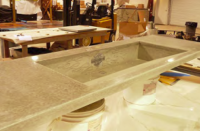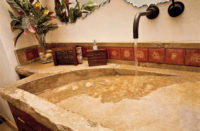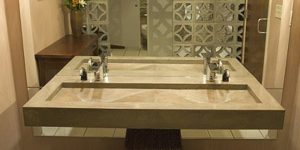
I’ve written a lot of technical articles educating you, the contractor, about various topics related to concrete countertops. But what good is your education if your potential clients are not also educated?
Concrete countertops have been around for decades now, and more and more magazines and TV shows are featuring them. So you wold think misconceptions such as “concrete countertops are cheap” or “concrete countertops are high-maintenance” would be a thing of the past. Unfortunately, that is not the case. Just last August, an article on the Yahoo! Homes website called “8 Kitchen Counter Options That Will Make You Forget Granite” offered this gem:
“New colorizing and stain techniques have made concrete counters more popular than ever. Skilled craftsmen can create beautiful concrete countertops in any color, shape and size. Embedded stones, tile or even silicone chips can be added to the mix to create a piece of art. The result is a beautiful counter that’s durable as well as scratch- and heat-resistant.
“The counters, which can be extremely heavy, are susceptible to damage from acidic liquids and must be sealed and regularly maintained to resist stains.”
In this article I will endeavor to give you ammunition to clear up misconceptions such as these — and get prospects as excited and inspired about concrete countertops as you are.
Misconception No. 1: Concrete countertops are cheap
They’re just concrete, so they must be cheap, right?
When people hear the word “concrete,” they often think of a sidewalk, or perhaps a driveway or parking garage. They may be unaware that the beautiful decorative surfaces they’ve seen in shops, restaurants and public spaces are actually decorative concrete, or they may have seen a high-quality concrete countertop and thought it was some kind of stone.
The best way to combat this misconception is with an analogy: Wood is cheap and plentiful. Many common items are made of wood, such as 2-by-4s or pallets. Those are cheap. However, violins are also made of wood. Should violins be cheap? No, of course not. Highly specialized wood is used by a skilled craftsperson to create something that is both functional and beautiful. Concrete countertops are the same.
Concrete countertops should be priced higher than granite. They are the more custom, personalized, unique surface, and that makes them the highest-end surface. Here’s another analogy to help you:
You can buy a suit for $200 off the rack at a store. You would probably have it hemmed to fit you. This is standard granite. Or, you could travel to London and have a tailor on Saville Row hand-make a suit to fit you. Concrete is even more custom than that. Concrete is like traveling to India to select the silk and wool threads to be used, specifying what thickness and color to make them and how to weave them together, and then flying to London to have the suit handmade. This would cost many, many times more than an off-the-rack suit. But concrete countertops cost just a little bit more than granite. That’s a fantastic deal!

Misconception No. 2: All concrete countertops are the same
Despite the fact that concrete countertops are high-end and should be priced accordingly, you may have a contractor in your area selling elevated sidewalks at low prices. Your prospects may be tempted by these low prices, figuring, “Concrete is concrete.”
If a prospect is concerned only with price, tell them concrete is not right for them and move on. If the prospect is genuinely interested in having a unique, custom surface, they will be willing to learn more and appreciate the education you provide them. They will build trust in you and prefer to do business with you rather than go with the cheapest price.
You can discuss with these prospects that not all concrete is created equal. Explain to them that concrete countertops use highly specialized mix designs (especially GFRC), and are not the same as a sidewalk mix out of a truck. Explain to them that the finishing techniques with coloring, diamond polishing and highly specialized sealers are completely foreign to a sidewalk contractor. Show them photos, such as those from The Concrete Countertop Institute website’s “Hall of Shame,” of what happens when an inexperienced contractor tries to make a concrete countertop. Show them samples and photos of your work so that they can see the level of craftsmanship.
This doesn’t have to sound like a desperate sales pitch or bashing anyone else. Present it as: “This is one of the most common misconceptions in the industry, and it’s unfortunate because it results in bad examples out there that give concrete a bad name. I’m very passionate about my craft, so I’m glad to have this opportunity to explain to you how high-quality concrete countertops are different.”
Misconception No. 3: Concrete countertops are just like granite or solid-surface
Your prospects may have seen concrete mentioned as an alternative to other countertop surfaces, for example in Consumer Reports magazine. However, they may have no idea of how much you can do with concrete that is very difficult or impossible with other surfaces. If they are thinking of concrete merely as an alternative to granite, you will be stuck competing with the plummeting price of granite.
Concrete can be so much more than just flat countertop slabs picked from a catalog or slab yard. It can have amazing decorative edges, like a rope or floral pattern. It can be color-matched to tile or paint. It can have integral sinks. It can have features such as integrated drainboards or cutting-board inserts. And way beyond those easy ways to customize concrete, it can be three-dimensional.
The possibilities are endless. As a concrete countertop professional, you should have GFRC and mold-making in your repertoire, so that you can create those impressive 3-D pieces to illustrate these possibilities. Show your prospects those possibilities, and they will get just as excited and passionate about concrete as you are.
Misconception No. 4: Concrete countertops stain/scratch/burn
There is a great deal of conflicting information in consumer media about the performance of concrete countertops. Some articles or shows say that it stains, some say it doesn’t. Some say it scratches, some say it doesn’t. What all of these media fail to point out is that concrete’s performance depends almost entirely on the sealer.
A few years ago, Consumer Reports included concrete for the first time in its annual countertop buying guide. Unfortunately they only tested one fabricator’s concrete and did not mention what type of sealer he used. They ended up reporting that concrete stains easily. I sent a letter to the editor, and the following year they tested one sample with a coating and one sample with a penetrating sealer. Here is what the magazine’s online Buying Guide currently says about concrete countertops:
“Concrete countertops can provide a unique look. This exclusive material is typically custom-formed by local fabricators, so quality may vary.
“Pros: Concrete can be tinted and textured and can include stone chips.
“Cons: It chips and scratches easily and can develop hairline cracks. Topical sealers can protect against stains but not heat; penetrating sealers can handle heat, but not stains.”
This is better, but still not quite right. Scratching also depends on the sealer. Plus you can do a lot more with it than embed stone chips.
What can you do about all these wildly varying reports of concrete’s performance? Know your sealer inside and out. Explain to prospects that performance depends on the sealer, and let them know exactly what the performance of yours is. Scratch a sample with your keys, in front of your prospects. Put ketchup on it in front of them, let it sit while you’re talking, then wipe it off and show them what happens. Tell them what will happen if they put a hot pot from the oven on it. Show them what a scratch or stain repair looks like and how to do it with the touch-up kit you’re going to provide them. Show them the maintenance procedure, whether that’s waxing periodically or just cleaning with a nonabrasive cleaner. Put all this in an Owner’s Guide that you include in the contract.

This level of disclosure may discourage some people from buying your concrete, but you do not want those clients because you are destined for callbacks from them.
This level of understanding also means that you have to test your sealer ahead of time. You have to know how it behaves and how to best repair it. Learn all of this before you ever present a sealer to a client. This is probably the single biggest thing that contractors can do to check the misinformation about concrete. Callbacks and dissatisfaction with concrete almost always stem from sealer problems borne of misunderstanding. Prevent that misunderstanding during the sales cycle, and horror stories about concrete countertops will stop.















